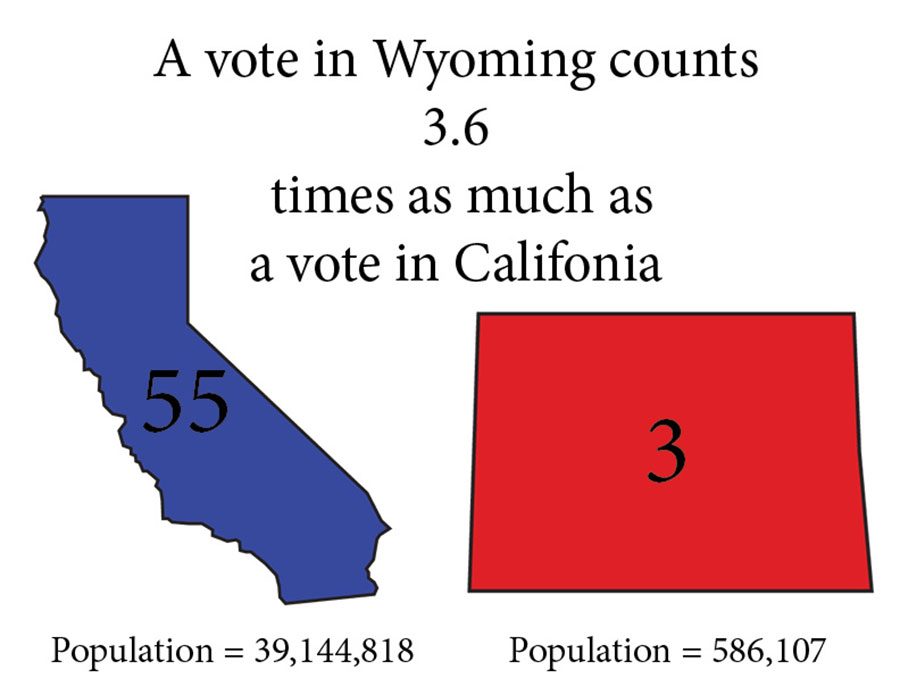Electoral College gains attention after recent election
The Electoral College is the system through which we elect our president in the United States. Many people have issues with our current system, including many students at South. Critics of the Electoral College point out that the vote of a person in Wyoming counts nearly three times as much as the vote of a person in California based off the ratio of population to electoral votes. Graphic: Eli Shimanski
November 30, 2016
The Electoral College has been receiving more attention lately due to the recent presidential election. Republican nominee Donald Trump won the 2016 election with 305 electoral votes while Democratic nominee Hillary Clinton won the popular vote by slightly more than one percentage point according to the New York Times. Many Americans are now asking themselves how does the Electoral College work and why do we have it?
The Electoral College is the process through which we elect our president. It is stated in the second article of the Constitution. The Electoral College is made up of 538 electors and each state receives a certain number of votes based off their population. A candidate needs 270, a majority of votes, to win.
The exact reason for the Electoral College is unclear. AP U.S. History teacher Jeffrey Buszta says that the best theory is the founders of our country didn’t trust the common people. This theory is supported by the 68th article of the Federalist Papers, written by Alexander Hamilton. In the paper Hamilton writes, “A small number of persons, selected by their fellow-citizens from the general mass, will be most likely to possess the information and discernment requisite to so complicated an investigation.”
Buszta appeared to have mixed feelings about the Electoral College. “Part of me likes it and part of me doesn’t. The reason I don’t like it is the average person doesn’t really understand it… Part of me likes it because I like to see how the states fall.” One of the big pitfalls that Buszta noted was the election of 1984. The election was called so quickly that many people didn’t bother to go out and vote because their votes no longer mattered. Buszta also commented that the news programs are a little more careful with calling elections today.
Another issue with the Electoral College is that not all votes are equal. For example, Wyoming has a population of 586,107 according to the U.S. Census Bureau’s 2015 estimate. Wyoming receives 3 electoral votes. California on the other hand has a population of 39,144,818 and receives 55 electoral votes. So in California there are around 711,724 people to every electoral vote and only 195,369 to every electoral vote in Wyoming. This means that the vote of a person in Wyoming counts over three times as much as the vote from a person in California.
It is true that without the Electoral College smaller states would receive far less attention and specific concerns those states may have wouldn’t be listened to as closely.
The Electoral College’s popularity with the public is on the decline as well as South students. Sophomore Bo Coultrip says, “It doesn’t properly represent the people. People’s votes in different places matter more than other people’s votes and that’s exactly what democracy is supposed to stop. It’s supposed to stop some people having higher voices than others.” Christopher East agrees, “It’s old and obsolete and it needs to go.”
According to gallup.com, 62% of Americans have said that they would amend the Constitution to replace the Electoral College with a popular vote. Some people remain hopeful but Buszta thinks it is unlikely that the Electoral College will be amended from the Constitution any time soon.





